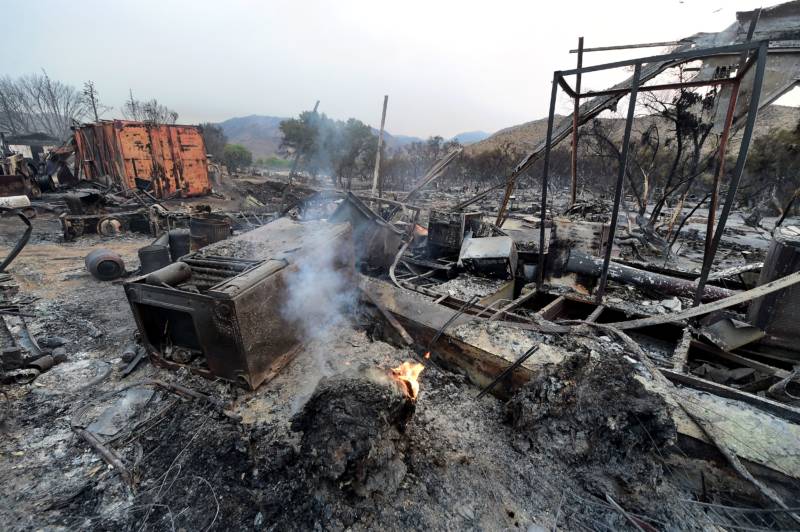Officials said that the unidentified victims appeared to be overcome by smoke as they tried to escape the blaze, which reportedly raced across 11 miles of terrain in the 13 hours after it broke out about 4 p.m. Thursday. Authorities withheld the exact location where the pair died.
Answering a question from reporters during the Friday evening briefing, Kern County Sheriff Donny Youngblood said he is concerned the fire may have claimed other victims surprised by the blaze's rapid spread.
David Klippel, 78, a retired police officer, told The Associated Press he didn't see much of a threat after receiving an automated call advising him to leave. That changed dramatically within an hour Thursday afternoon.
"I've never been so close to a fast-moving, ferocious fire. It was unbelievable," said Klippel, who later learned his house had caught fire. "I almost didn't have time to get out."
Officials say about 1,500 homes are threatened by the fire and about 2,000 people have been forced from their residences.
Some 800 firefighters are on the scene, with hundreds more on the way. Seven helicopters and half a dozen fixed-wing air tankers will fight the fire Friday, including a jumbo jet from a private fleet frequently deployed to fight the most dangerous wildfires.
The blaze began amid ideal fire conditions: 90-degree heat, single-digit humidity and winds that reached 35 mph whipped the fire through a steep landscape that got little relief from last winter's sparse El Niño rains.
"The forces of nature collided with a spark," Kern County Fire Chief Brian Marshall told the AP.
A red-flag warning for dangerous fire weather continues through Friday.
The Los Angeles Times quotes Kern County Fire Capt. Tyler Townsend describing the blaze as “extremely dangerous, extremely volatile."
“I've never been in a wildland fire where I've seen so many homes burn,” Townsend told the Times. “It's one of the most devastating I've ever seen.”
Here's the latest Associated Press write-up on the fire:
LAKE ISABELLA, Kern County— A deadly wildfire that roared through dry brush and trees in the mountains of central California gave residents little time to flee as flames burned dozens of homes to the ground, propane tanks exploded, and smoke obscured the path to safety.
Two bodies were found Friday near Lake Isabella, a popular recreation area east of Bakersfield that was ravaged by wind-whipped flames, said Phil Neufeld, a spokesman for the Kern County Fire Department.
At least 80 houses were destroyed in the southern Sierra Nevada as the fire burned out of control across 29 square miles, leveling neighborhoods and forcing thousands of people to flee from fast-moving flames.
David Klippel, 78, a retired police officer, said he didn't see much of a threat after receiving an automated call advising him to leave. That changed dramatically within an hour Thursday afternoon.
"I've never been so close to a fast-moving, ferocious fire. It was unbelievable," said Klippel, who later learned his house had caught fire. "I almost didn't have time to get out."
Neighborhoods of mobile homes were charred to their foundations. Gusty winds pushed the flames and smoke farther into drought-starved terrain.
"The forces of nature collided with a spark," Kern County Fire Chief Brian Marshall said. "The mountainous terrain, five years of drought and wind gusts of over 20 mph all drove a fire over 11 miles in 13 hours."
Scorching heat and tinder-dry conditions across the West have contributed to massive wildfires in the past week that have destroyed properties and sent residents to seek shelter and hope for the best.
Laura Rogers was one of those who thought she'd never see her home or her brother's home again. Instead, she was lucky to find both standing in a neighborhood of mobile homes that was devastated.
"I was sure this place was gone last night," Rogers said through tears as she gestured at the destruction around her. "I mean look at this, I can't believe it. It's like a scary movie."
The downspout of her brother's home was melted on the ground, but the structure was intact.
Dozens of other homes were gone, left in piles of charred sheet metal and cinderblock foundations. Scorched tricycles, air conditioners and TV dishes littered the landscape. Burned-out cars sat on tireless rims and leafless trees poked from barren, blackened dirt.
The California blaze erupted quickly, putting some 1,500 homes in jeopardy. Three firefighters suffered from smoke inhalation.
Crews faced a "firefight of epic proportions" as they tried to protect neighborhoods, Marshall said. Officials said they expect to find many more homes destroyed as the smoke clears and they do a more thorough check of smoldering neighborhoods.
Gov. Jerry Brown declared a state of emergency, freeing up money and resources to fight the fire and cleanup its aftermath. It also temporarily suspends some state regulations and waives fees as a way to ease the return of evacuees and those who have lost homes.
Dramatic video from Thursday night showed homes fully engulfed and others already gone as propane tanks flared up and popped. Flames glowing in the steep, rocky hillsides were reflected on the lake.
Residents described a frantic flight from communities surrounding the lake, a dammed section of the Kern River that is a destination for boating, fishing, rafting, hiking and camping.
Cachet Kirby, 22, of Mount Mesa and her neighbors grabbed clothes, blankets and their dogs and fled through thick smoke as flames charged down the slopes.
"It was to the point you couldn't see, you couldn't breathe," she said.
She and others, exhausted Friday morning after little sleep in shelters and cars, were desperate for information about their homes.
"We could have gotten lucky and the wind shifted, or our house could be burned down," Kirby said.
Cellphone service was cut off in many areas, contributing to the anxieties.
Very low humidity and gusty winds of up to 55 mph could worsen the blaze that broke out amid high temperatures and climbed over at least three ridges into hillside neighborhoods.
